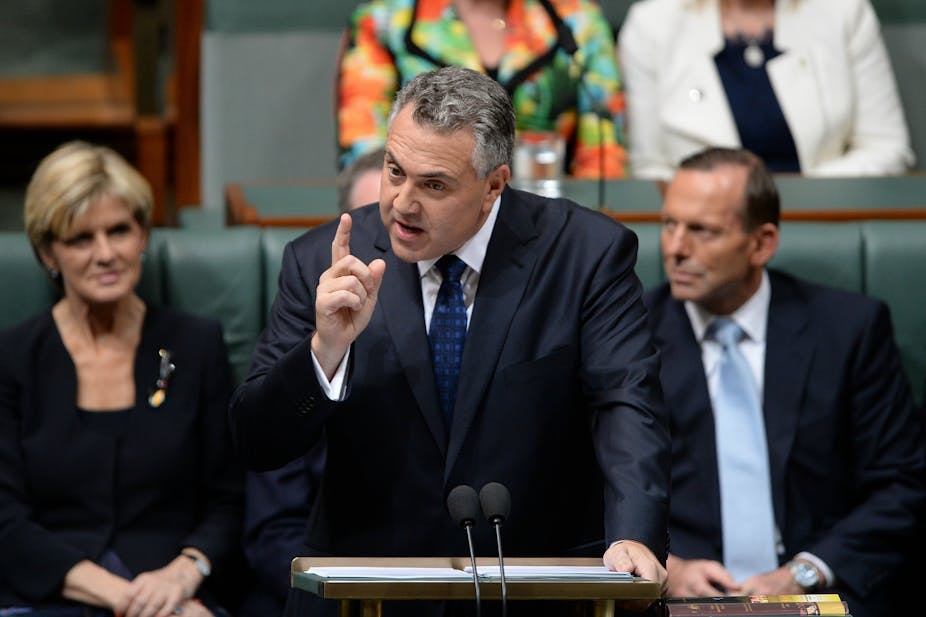In 2012, then-opposition treasury spokesman Joe Hockey gave a speech in which he declared that the age of entitlement had to end. But he did not deliver it to a domestic audience. Instead, he went to the other side of planet, to London and a free-market think tank (the Institute of Economic Affairs), to reveal his plan for the Australian people.
Hockey got a lot of credit from many media commentators for what they regarded as his bravery and candour. Well-paid journalists, bank economists and policy analysts find it hard to resist that sort of message of denial.
Back in Australia, all the way to the 2013 election, neither Hockey, upon his return to our shores, nor his leader Tony Abbott pushed the content of that speech. Indeed, they went the other way.
In the face of a relentless onslaught from Labor during the election campaign, with warnings that an Abbott government would, according to Kevin Rudd, “cut and cut and cut and cut”, Abbott pledged not to increase taxes. He promised instead to cut tax and not to introduce new taxes. He also promised that health, education and the ABC would not be cut.
Last night, at last, Hockey got around to delivering a much more profound and far-reaching version of that London speech. As treasurer delivering his first budget, the one that laid out the markers for the new government, he made flesh the thoughts and aspirations so carefully delivered two years ago in the Old Country.
Clearly, Abbott has signed on wholeheartedly to his treasurer’s prescription for this recast version of Australian society. Delivered under the rubric of repair – a necessary corrective for Labor’s budgetary mess – it is in fact a clear-headed and deliberate essay in creating a new sort of Australia.
The removal of various elements of the safety net for the unemployed and the sick, the killing of industry assistance, the deregulation of university fees, the squeeze on pensions and family payments: all of these are about remaking the nation in important ways.
Hockey’s language in his budget speech provided powerful pointers to the way he wants to portray government to voters. Government interferes. It regulates. It’s a burden.
At the outset, Hockey could not have been clearer: his mission as treasurer, with the support of the prime minister and the government’s senior ministers, is to redefine the role of government. In this case, to make it much smaller.
Simultaneously, Hockey wants to foster the development of a new type of Australian: one who is more self-reliant, who does not look to the state to get them out of a jam or who will expect financial assistance from government to back up their life choices.
That sort of ambition does not grow from a set of budgetary numbers delivered by Treasury bureaucrats in the Canberra summer and early autumn, it springs from a worldview formed over a very long time.
That aspiration was not all that different to some of the noises that came from another Liberal treasurer delivering his first budget all of 18 years ago. Back then, Peter Costello introduced big cuts to Labor programs and explained his mission in similar epochal terms.
Within five years, various brushes with political mortality shifted the balance inside that government and persuaded Costello’s prime minister, John Howard, to jettison the small-government, tough-medicine talk and to embrace the open-chequebook approach for any voting bloc that looked like it might be getting a little bit wobbly. This proved to be something of an addiction for voters and for Howard.
As has been observed by several commentators already, Hockey is repudiating not just Labor’s sometimes cack-handed version of social democracy but Howard’s late-era government-is-here-to-help-you-out method too.
The question now is: having finally seen what the Abbott government is all about – and what it really wants to do rather than what it said it would do in order to avoid potholes on the way to the election – will the community want to join Hockey in his mission?
It is a pretty simple situation. Before the election, Abbott said that he could fix Labor’s mess without referring to any need for Australians to make sacrifices. Now, his entire enterprise rests upon Australians accepting sacrifices. In real terms, millions of people near the bottom of the income pile, and in the middle too, will have to surrender income either through the loss of direct payments, new imposts or expected rises forgone.
It is often said that Australians have in the past embraced or at least tolerated prescriptions from new governments that require them to put up with some financial pain. That’s true. It happened in the early period under Bob Hawke and again at the outset of the Howard government.
The difference between 2014 and then is that in the instance of both of those neophyte governments, recessions were very much part of the lived experience. With Hawke, the recession was still going in 1983 when he took power. For Howard, the economy was recovering in 1996 but the early 1990s recession – the worst in 60 years – was very much fresh memory.
This time around, Australia has avoided the recession that hit so many of our trading partners. Having not had to go through widespread hard times, many contemporary voters will wonder just how much of an emergency there really is afflicting the country, especially when they were promised a “magic wand” style of budgeting – in which no-one would be hurt and there would be no need for new taxes – on the way to electing the Abbott government.
If only they could have been at that think tank in London in 2012.

